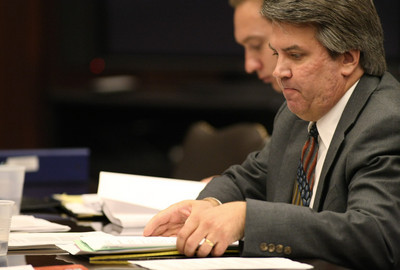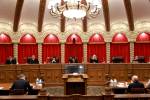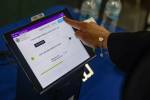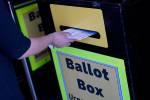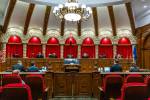Court asked to put initiatives on ballot
CARSON CITY -- The will of thousands of voters who would like the chance to provide more money to education and other public needs should be honored by placing a pair of initiative petitions on the November ballot, the Nevada Supreme Court was told Wednesday.
The court, mindful of the looming general election, said it will rule as quickly as possible in the case pitting proponents of the initiative petitions against convention and union officials.
Two measures propose to divert Las Vegas convention revenue to public education and other statewide needs. The third measure would implement a two-thirds vote requirement for ballot questions that sought to raise taxes.
A lower court ruled in July that the affidavits did not include all the information required by the Nevada Legislature, effectively keeping the measures off the general election ballot.
But attorney Scott Scherer, representing the ballot proponents who are backed by Las Vegas Sands Corp. Chairman Sheldon Adelson, told the court the wording of the measures is straightforward and complies with state law.
Scherer also asked the court to rule that affidavits that accompanied the signatures collected by petition gatherers for all three measures be found in substantial compliance with state law.
"This is a case where all parties have made mistakes," Scherer said. "The question we would ask this court to bear in mind throughout these proceedings is, who do we hold to a higher standard, private citizens or public officials."
Opponents of the measures, including the Las Vegas Convention and Visitors Authority, the Nevada State Education Association, the Nevada AFL-CIO and local government entities, asked the court to find that the two measures aimed at diverting convention authority revenues violate a requirement that ballot measures confine themselves to a single subject.
They also argued that the affidavits submitted by the people who gathered the signatures for all three measures failed to follow rules established by the Legislature aimed at preventing fraud.
Scherer said no fraud has been alleged in the signature gathering effort for the three petitions.
But Wayne Howle, solicitor general for the attorney general's office, representing Secretary of State Ross Miller, said the case would not be in front of the court if the petitioners had followed the rules. Miller in June rejected the three petitions because of the affidavit concerns.
"The real reason we're here today is because the proponents didn't read the law," Howle said. "This signifies simply a lack of due diligence."
The court took the case under review after nearly two hours of arguments. Chief Justice Mark Gibbons said the court would rule as quickly as possible, given the brief time remaining for election officials to prepare ballots for the November general election.
The court, with former Justice Bob Rose sitting in for Justice Ron Parraguirre, who had a conflict, did not give any hints at how it might rule in the case.
The three petitions were turned in May 15 with approximately twice the number of signatures required to get them on the November ballot.
One of the convention authority measures would take most of the new room tax money directed each year to the agency and divert it instead for use by the Legislature for public education. A second measure would do the same but would direct the money instead to state education, transportation and public safety needs in equal amounts.
If the measures are allowed to be on the ballot, and if they are approved by voters, they would have to be approved a second time in 2010 before they could take effect. In the case of the two funding measures, the one that received the most votes would take effect.
There are two separate sets of arguments in front of the court.
One issue deals with the affidavits submitted by petition gatherers, and whether they comply with state requirements. This issue provoked the most questions from the court and took the most time. A lower court ruled the affidavit rules were not followed.
The other is whether the ballot question descriptions are clear and accurate and whether the measures confine themselves to a single subject. Justices had fewer questions on this issue. This argument was rejected in April in Carson District court.
On the affidavit questions, Scherer said those who signed the petitions were given the opportunity to read the measures, even though the affidavits submitted with the signatures did not include this information as required.
But Todd Bice, an attorney representing the convention authority, said the petition backers did not even know of the new affidavit requirements, which were approved by the 2007 Legislature, until after the signatures were turned in.
"It can't be undone now after the fact," he said.
The ACLU of Nevada filed a friend of the court brief with the court in support of putting the measures on the ballot, arguing that procedural rules should not discount the will of the thousands of registered voters who signed the petitions.
The three petitions were circulated by former state Treasurer Bob Seale and former state Controller Steve Martin, with financial support from Adelson. None was present at the hearing.
Adelson operates his own convention business that competes with the publicly funded convention authority.
In comments made earlier this year, Seale said the flow of money to education and other state needs would be small at first if the measures were approved by voters. But revenues would increase dramatically as additional hotel rooms open in Las Vegas, he said.
The convention authority now receives about $200 million per year in room taxes.
Robert Uithoven, a political consultant and spokesman for the ballot measures, said a favorable decision from the court would give opponents what they want, a chance for the issues to be debated in front of voters.



